Counseling service makes important contribution at temporary hospital
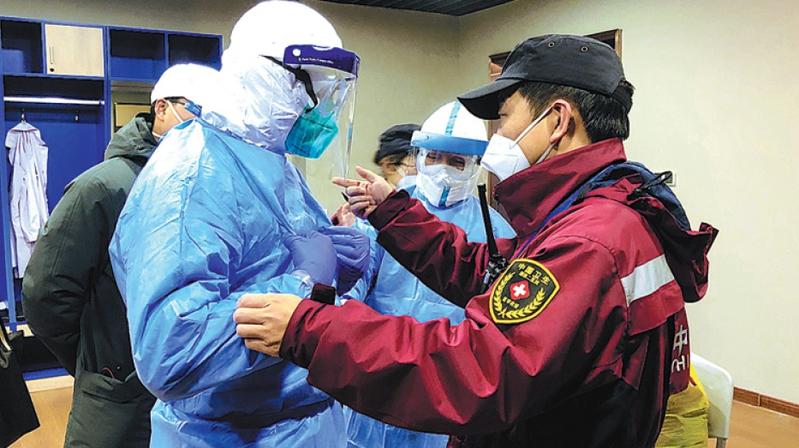 Wang Yang (right), captain of the emergency medical team from The Second Xiangya Hospital of Central South University, helps Yu Song, head of Wuhan's Wuchang district, put on protective clothing during Yu's visit to the district's temporary hospital in Hubei province, on Feb 7. (LI JIANING / FOR CHINA DAILY)
Wang Yang (right), captain of the emergency medical team from The Second Xiangya Hospital of Central South University, helps Yu Song, head of Wuhan's Wuchang district, put on protective clothing during Yu's visit to the district's temporary hospital in Hubei province, on Feb 7. (LI JIANING / FOR CHINA DAILY)
Editor's note: Over 270 teams comprising more than 32,000 medical workers had arrived in Hubei province from across the country. China Daily chronicles their work in a series of interviews with the doctors and nurses.
After a five-hour drive from neighboring Hunan province, Xu Junmei and his colleagues were the first of 22 emergency medical teams to arrive in Wuhan, Hubei province, on Feb 4 to run temporary hospitals in the epicenter of the novel coronavirus pneumonia outbreak.
They had been summoned to the stricken city the day before.
I want to thank the country’s top medical team from The Second Xiangya Hospital who have come to help us in Wuhan. Not only have they given us excellent physical treatment but also comprehensive psychological counseling
Cheng Chuchu (alias), a patient at the makeshift hospital in Wuhan
The hospital where they work has been converted from a major sports stadium in the city's Wuchang district. They arrived so early that the conversion work had yet to be completed.
Their first tasks were to have tents erected outside the stadium, arrange for facilities to be set up and examine wards prepared for patients.
The temporary hospital accommodates more than 700 patients who have tested positive for the disease but who exhibit no severe symptoms. They have also tested negative for flu viruses, to ensure that there is no cross-contamination. Four doctors and 12 nurses care for every 50 patients.
Xu's team, from The Second Xiangya Hospital of Central South University in Changsha, capital of Hunan, began treating the first group of patients, who arrived before dawn on Feb 5. By 7:30 am, there were 328 patients.
On the first day, an elderly woman burst into tears when she was told to arrange for a relative to bring her some necessities. She said she had lost her husband to the virus and her son was still in an intensive care unit, so she was on her own. Her plight silenced patients in the ward, before they, too, began sobbing.
The patients, accommodated in wards divided by boards, do not know their health status and are all under immense stress.
On arrival, Xu, who was appointed vice-president responsible for medical treatment at the makeshift institution, contacted his hospital in Changsha to suggest that psychological counseling services be provided for the patients and medical workers in Wuhan.
When he visited patients, he saw that they became stressed and even agitated in an unfamiliar environment, complained about living conditions and were worried that they would not be treated properly.
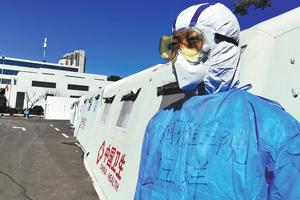 Wang Yang, head of the emergency team. (PHOTO PROVIDED TO CHINA DAILY)
Wang Yang, head of the emergency team. (PHOTO PROVIDED TO CHINA DAILY)
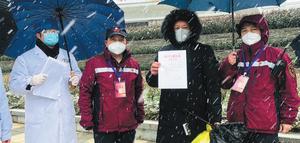 Xu Junmei (center), vice-president of the makeshift hospital, with a cured patient. (PHOTO PROVIDED TO CHINA DAILY)
Xu Junmei (center), vice-president of the makeshift hospital, with a cured patient. (PHOTO PROVIDED TO CHINA DAILY)
The wards where patients are accommodated have a range of equipment to monitor their condition. If a patient's symptoms worsen, he or she is transferred to a designated hospital for further treatment.
But with so many people living under one roof, psychological counseling has become necessary, along with the need to explain the hospital facilities.
At Xu's suggestion, a handbook titled Walking into Fang Cang was produced overnight-fang cang is the Chinese name for makeshift hospitals. A digital version of the handbook was released in the morning on Feb 7 and 1,000 printed copies were delivered to the makeshift hospital in the afternoon. A new handbook titled Walking out of Fang Cang was produced on Sunday.
Wang Yang, head of the Xiangya team working at the Wuchang Fang Cang makeshift hospital, said: "This handbook helps patients remain calm and gives them strength to fight the disease. It also gives medical workers scientific means to better identify patients' psychological issues and address them accordingly."
A 24-hour hotline was also set up by The Second Xiangya Hospital in Changsha to help patients experiencing mental problems.
When they deal with patients, doctors and nurses pay special attention to working methods and communication skills. During the diagnosis and treatment process at the makeshift hospital, the medical workers talk with the patients calmly and patiently, to ensure their anxieties are handled properly and are resolved.
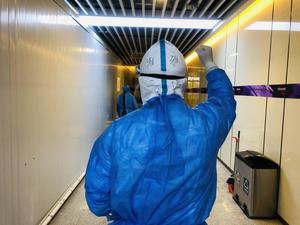 Xu at the hospital. (PHOTO PROVIDED TO CHINA DAILY)
Xu at the hospital. (PHOTO PROVIDED TO CHINA DAILY)
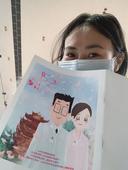 A patient holds a handbook offering guidance. (PHOTO PROVIDED TO CHINA DAILY)
A patient holds a handbook offering guidance. (PHOTO PROVIDED TO CHINA DAILY)
Respiratory physician Xiao Kui, who heads a team of 12 doctors, said that when they work back home in Changsha they usually do not have to worry unduly about patients' psychological condition, but the situation at the makeshift hospital is totally different.
With doctors and nurses being extremely short-handed, he looked for people who had remained optimistic amid the outbreak to help organize their fellow patients and offer support. Xiao quickly realized that Cheng Chuchu (alias), a 37-year-old woman, was a good candidate for this work.
Cheng, a former medical student, happily accepted his suggestion and became a volunteer assisting medical workers and other patients. An online group was formed on WeChat to better organize this work and to exchange information and offer additional help. Cheng has also coordinated an online dance class every evening for her fellow patients.
In turn, the patients began to organize their own leisure activities in addition to following medical instructions.
Cheng became known by other patients as quzhang, which means district governor.
"She can better comfort other patients because she is a patient herself," Xiao said. "I am glad that the patients in the East Inpatient Area (where the Xiangya team works) are all mentally stable, which is also good for their recovery."
The Xiangya team comprises 42 members-12 doctors, 11 nurses, six pharmacists and technicians, and 13 drivers and engineers from The Second Xiangya Hospital of Central South University.
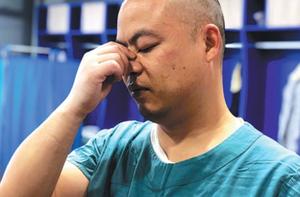 Radiology technician Jiang Shan. (PHOTO PROVIDED TO CHINA DAILY)
Radiology technician Jiang Shan. (PHOTO PROVIDED TO CHINA DAILY)
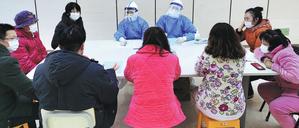 Nursing director Zhang Huiling and nurse Liu Jin organize a psychological counseling workshop for patients. (PHOTO PROVIDED TO CHINA DAILY)
Nursing director Zhang Huiling and nurse Liu Jin organize a psychological counseling workshop for patients. (PHOTO PROVIDED TO CHINA DAILY)
This team and four others from Beijing, Shanghai, Fujian and Liaoning provinces run the makeshift hospital with teams from five local medical institutions.
Patients who recover are discharged from the hospital if they are given the all-clear after a series of tests.
Xu, the hospital vice-president, said:"We have helped improve conditions in the wards and have given patients standardized medical treatment and psychological support. We have also been optimizing the work flow and are making the makeshift hospital operate more like a regular one."
The first 28 patients from the hospital, including Cheng, were discharged on Feb 11. Having been treated for five days, she was the first to leave for home.
"The makeshift hospital was comparatively shabby when I first came here. We were unclear about our health status, so we were initially all very stressed and depressed. I am an optimistic person, but I also felt panic and shed tears secretly in the restroom," Cheng said.
She soon changed her mindset and began offering support to others, while facilities available at the hospital were greatly improved. Before Cheng left, she listed her experiences during the five days: sharing with other patients; cooperating with doctors and nurses; cheering yourself up and those around you; and drinking 5 liters of water a day.
"I want to thank the country's top medical team from The Second Xiangya Hospital who have come to help us in Wuhan. Not only have they given us excellent physical treatment but also comprehensive psychological counseling," Cheng said.
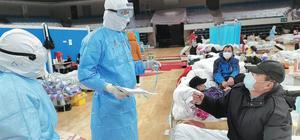 Liu checks the hospital wards. (PHOTO PROVIDED TO CHINA DAILY)
Liu checks the hospital wards. (PHOTO PROVIDED TO CHINA DAILY)
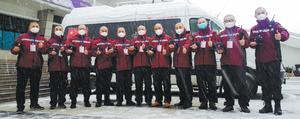 The Xiangya team prepares to start work in Wuhan. (PHOTO PROVIDED TO CHINA DAILY)
The Xiangya team prepares to start work in Wuhan. (PHOTO PROVIDED TO CHINA DAILY)
The Xiangya medical school and its hospitals, with a history of more than a century, have helped shape the development of Western medicine in China.
Since the epidemic broke out, The Second Xiangya Hospital of Central South University has sent 177 medical workers to Wuhan and a total of 500 staff members from the three Xiangya hospitals have arrived in the city.
Liu Jin, 26, a nurse caring for patients with psychological problems, is one of the Xiangya emergency team. "One of the obstacles to patients' treatment is that many of them have a strong sense of guilt. They are worried that they may have infected their family members and those around them," he said.
"Some of them will not contact their families on a regular basis, and when they do call home, they only state briefly 'I am good here', but not much more."
Liu spoke of one woman in her 30s, who had always been quiet and appeared to be worried, but with his help, she became more optimistic.
"I chatted with her a lot and found that she was the first in her family to be hospitalized. She was so worried that she might have infected her child, and it was constantly on her mind that she might end up losing the child."
Liu helped the woman to draw up a timetable of her daily activities and to join dancing and other activities organized by the hospital.
He also advised her to talk more with other patients, to spend less time in bed in the day and not to look at her phone too much. "She was reading too much news about the disease. She needs to read less," he said.


